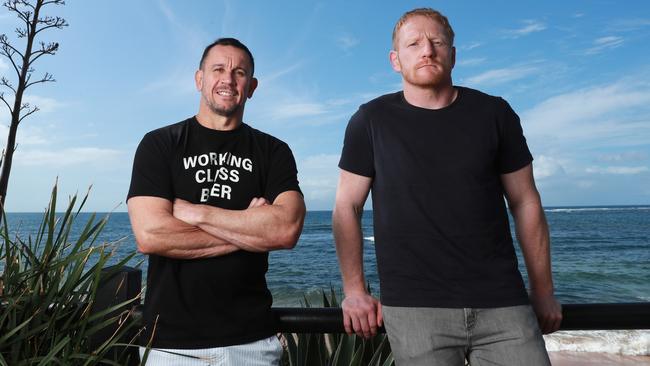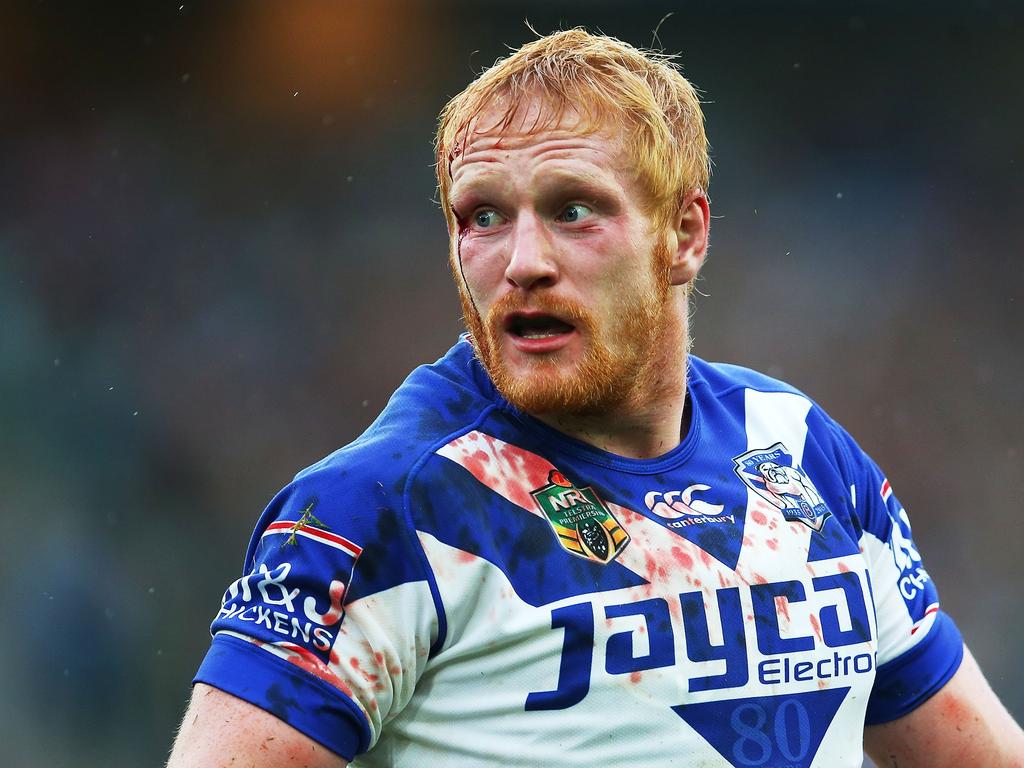‘I don’t blame the game. I don’t blame the doctors..it’s just the way it was’
Matthew Johns opens up in an extraordinary interview with James Graham for the second episode of Head Noise.

Matthew Johns was six when he was first knocked out cold on the footy field.
By the age of eight, the future superstar of rugby league was accustomed to the raw physicality of Hunter Valley football: get knocked out, get up again.
In a new episode of The Australian’s chart-topping investigative podcast Head Noise, Johns reveals a statistic that shocks even James Graham, the podcast’s host and also a former league star.
Johns said he was concussed 70 or 80 times from junior footy to his retirement at the top of the game at the age of 31.
“Not always straight knockouts, just being stunned, or as we used to say back then, the wobbly boot,” Johns said.
Johns, now a successful TV host with Fox Sports and anchor of top-rating podcast The Matty Johns Show, is Australia’s most successful ex-footballer.
“I’m really proud of how the NRL have reacted to the concussion issue,” Johns said. “Whereas the NFL in America totally denied it was an issue, the NRL have acted on it immediately and put protocols in place to ensure the game is safer. The game’s a hell of a lot safer than the ’70s, ’80s and even the ’90s.”
Johns knows his life would be remarkably different if it wasn’t for what rugby league gave him.
“Without rugby league I was probably going to work as a labourer or I was going to work down a coalmine,” Johns, now 51, said. “So, I would do absolutely whatever it took, and it was such a badge of honour to get knocked out and wake up in the sheds.
“Would I do it now, if I wanted to have a career in football? I would,” Johns said. “Because back then if I didn’t dive on (a loose ball), there was every chance that they tapped me on the shoulder and said, ‘Mate, we’re just gonna let you know you’re never gonna play first grade at this club’. Now, that’s not to point the finger at the club or the coaches because that was the standard they set. And they didn’t know then what they know now. So, would I dive on the loose ball? Yes.”
In a thoughtful discussion on concussion, Johns said he believed players should not be allowed to decide for themselves whether they are fit to play on after a head knock.
He said there was an enormous temptation for footballers to minimise their symptoms in order to stay on the field.
Johns said footballers’ love of the game and their teammates blinds them to the potential long-term consequences of concussion.
“There were times that I’d be in a shed before really big games and I’d go, ‘Why am I crying?’ It’s because your emotions are so high,” he said. “And at that point, I would go on the field. And I would do whatever it took, whatever it took absolutely. My teammates were like family.
“You’re telling me that I get a little knock on my head and you’re telling me I can’t go back on? That’s bullshit. There is no way in the world.
“You and I don’t care about the consequences going forward, because you’re 26 and you feel sweet and you’re ready to go. That’s where it absolutely needs to be taken out of the player’s hands.”
It’s natural for footballers to minimise their symptoms, Johns said – especially as the finals approach. “I will be honest with you, even with what I know now, if I wake up in the sheds and (it’s a) semi-final, and the doctor goes to give me the [concussion] check, what do I say? ‘Oh man, I’ve got a whack in the jaw. I wasn’t really blacked out or it’s just a bit, you know, I was bit stunned and I’m fine.’ … Would I do things differently? I’m not exactly sure.”
The former Newcastle Knights and Cronulla five-eighth’s skills were honed in the Hunter Valley, where he began playing at five and was first knocked out at six.
“I remember waking up with the St John’s ambulance man over the top of me going, ‘How many fingers I got holding up?’,” Johns said. “I said, ‘Mate, two’. He said, ‘Spot-on, go again’. That was just the way it was.”
Johns said every time he was severely concussed he’d experience a “deja vu” memory of being with his grandfather on a merry-go-round.
“How many times I’ll get knocked out when I was a kid … It happened a lot,” he said.
“But whenever I got a head knock, whether it was a knockout or micro-knockout, I always had deja vu. I could never remember exactly what it was. It had something to do with my grandfather. But it was only when I got that hit that I would actually go: ‘Oh, that’s what it is again’. A bit like a scratch on a vinyl record and I would just go there.”
Johns said he was unsure if he had long-term symptoms related to head trauma, but insisted he did not feel aggrieved or regretful.
“I certainly don’t present myself as a victim. I don’t blame the game. I don’t blame the doctors or anything like that. Because it’s just the way it was,” he said.
In 2019 Johns conducted a stirring interview with his brother, Andrew, with the immortal revealing he had frontal lobe epilepsy, which he said may have been caused by head knocks he suffered during his career.
Johns said in the 1980s and 1990s there was a combination of old-school “thuggery” and newer rules that sped up the play and intensified collisions.
“There were guys just ahead … who when I look back now were at a really dangerous part of rugby league history,” Johns said.
“The players were getting more powerful, strong, but the thuggery was still there,” Johns said. “The hookers, they come off like every scrum, they were getting headbutted. The tight props were headbutting each other in each of the scrums, and the impact was so much more … the players [had] become stronger and more powerful.
“When you started to move into winter the field became like cement, so players would knock their head on the ground and be completely knocked out.”
–
Subscribers to The Australian have complete access to Head Noise. Subscribe to The Australian here.
Episodes of Head Noise are available in The Australian’s app. Download the app: (iOS | Android)
Go to headnoisepodcast.com.au to find out more






To join the conversation, please log in. Don't have an account? Register
Join the conversation, you are commenting as Logout